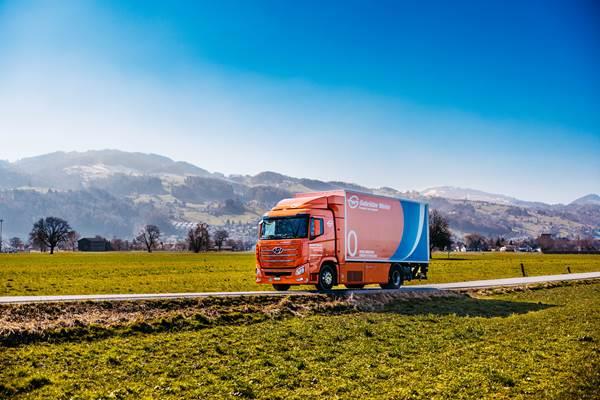Gebrüder Weiss announced that the first hydrogen truck it introduced in its fleet has so far saved 80 tons of CO2 emissions in a year after covering 70,000 kilometers (43,495 miles).
The German logistics company noted that the Hyundai XCIENT Fuel Cell was stationed in Altenrhein (Switzerland) and is used on a daily basis in short-distance general cargo transport and has proven itself there in all seasons — and even on uphill stretches, the electric motor, which draws power from a fuel cell, retained full performance.

"The utility vehicle saves around 80 tons of CO2 emissions per year," Gebrüder Weiss said.
Since taking delivery of the 36-ton truck in January 2021, the vehicle has covered around 70,000 kilometers. Consumption was even lower than the value specified by the manufacturer, and in one year, there was only a single visit to the workshop for the technical inspection.
"The purchase was a worthwhile investment in resource-saving road freight transport. The truck is well received by the drivers and, above all, by the customers," says Peter Waldenberger, head of quality and environmental management at Gebrüder Weiss.
Hydrogen trucks for Austria-Germany
Gebrüder Weiss said it plans to use hydrogen trucks in Austria and southern Germany as well in the future since subsidy programs in Germany make their use north of the Alps attractive — although noting that a limiting factor is the availability of hydrogen filling stations, of which nine already exist in Switzerland.
In addition to the fuel cell truck, the logistics provider already has several gas trucks on the road in Austria, Germany, and Serbia, as well as electrically powered trucks and vans in the greater Vienna area – among others for its client IKEA in the home delivery sector.
Gebrüder Weiss' hydrogen truck has a permissible total weight of 36 tons; a maximum speed of 85 kilometers per hour; a tank capacity of 32 kilograms of hydrogen; and an average daily range of 430 kilometers.
It has a consumption of approximately 7.5 kilograms per 100 kilometers and a range with one tank filling reaching 450 kilometers.



